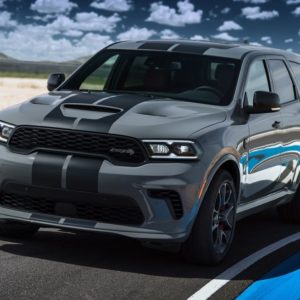In 2008, Tesla introduced its initial offering: the all-electric Roadster. Just two years later, Nissan debuted the Leaf as the first mass-produced electric vehicle (EV) in the United States.
Fast-forward a little over a decade to 2021, and EVs—once considered a novelty—are now poised to take over the automotive industry. General Motors (GM) announced it would transition to selling only EVs by 2035. Then Jaguar and Volvo followed suit, pledging to move to 100% electrification.
One by one, the automakers are starting to turn their backs on gas-guzzling behemoths by committing to a future that revolves around renewable energy. Several major vehicle manufacturers have now vowed to make the shift to an all-electric lineup.

6 Major Automakers That Are Moving To All-Electric
GM was one of the first automakers to announce its intention to transition to 100% electrification. But it wasn’t long before other vehicle manufacturers began to speak up, declaring similar goals. The following companies have vowed to convert their entire lineup to electric propulsion in the near future.
Jaguar By 2025
In 2019, Jaguar introduced its first all-electric vehicle, the I-Pace. Now, the British subsidiary of Indian automotive company Tata, is going all out by promising to make its entire lineup electric by 2025. To be clear—that’s just four years from now.
The goal seems lofty since Jaguar’s current portfolio consists primarily of thirsty, combustion-powered sports cars and SUVs. But if Jaguar can meet that deadline, it will become the first automaker to transition to 100% electrification.

Volvo By 2030
Volvo was one of the first automakers to start down the road toward electrification. Back in 2019, the trademark Swedish car company, which is owned by Geely Holding of China, began selling only hybrid-electric vehicles. A few years later, the brand debuted its first pure EV, called the XC40 Recharge.
Now, Volvo is ratcheting things up a notch by promising to do away with internal combustion engines altogether. The automaker says that, by 2030, it will eliminate the hybrid vehicles from its fleet and shift entirely to EVs.
“There is no long-term future for cars with an internal combustion engine,” said Henrik Green, the chief technology officer at Volvo. “We are firmly committed to becoming an electric-only car maker and the transition should happen by 2030. It will allow us to meet the expectations of our customers and be a part of the solution when it comes to fighting climate change.

Bentley By 2030
Last year, even before GM pledged to go all-electric, luxury car company Bentley stepped up to the plate. Despite the fact that Bentley’s current lineup of vehicles all have massive internal combustion engines, the automaker says it will exclusively sell EVs by 2030. But first, it will begin phasing in more electrified vehicles, starting with the 2020 Bentaya Hybrid.

Ford By 2030 (In Europe Only)
Europe’s share of the global EV market nearly doubled to 43% during the year 2020. Tightening emissions regulations in Europe are part of the reason for this drastic increase. Several countries, including the United Kingdom, plan to ban the sale of internal combustion-powered vehicles soon.
In response, Ford, which has been steadily growing its portfolio of EVs worldwide, has declared that its European market light-duty vehicle lineup will be all-electric by 2030. The Detroit automaker also said that all of its models would be available in either electric or hybrid form by 2026.

Nissan By The Early 2030s (In Key Markets)
Earlier this year, Nissan announced its goal to become carbon-neutral—meaning it will produce net-zero carbon emissions—by 2050. As part of that objective, the automaker said it would go all-electric in the key markets of Japan, China, the United States, and Europe by the early 2030s.
“We’re determined to help create a carbon-neutral society and accelerate the global effort against climate change,” said Nissan CEO Makoto Uchida. “Our offering in electrified vehicles will continue to expand around the world, and this will make a major contribution to Nissan becoming carbon neutral. We will continue to drive innovation that enriches people’s lives as we pursue a sustainable future for all.”

General Motors By 2035
Mary Barra, Chairman and Chief Executive Officer of GM, earned plenty of media coverage earlier this year by announcing that General Motors would go all-electric by 2035.
Although Barra has been proclaiming GM’s commitment to EVs for some time, the news still comes as a surprise. The automaker’s current best-selling vehicles are large, internal combustion-powered trucks and SUVs that don’t even remotely align with the goal of carbon neutrality.
Nevertheless, GM promises it will phase out all light-duty vehicles that run on gasoline or diesel by 2035 and become carbon-neutral by 2040. GM will also be working on clean technology for heavy-duty trucks as part of its endeavor to become carbon-neutral. Last month, the company announced it would be taking the first step by supplying fuel cells to truck company Navistar International.

Why EVs and Why Now?
EV adoption has been making steady progress for some time. But the drastic shift towards electrification in 2021 has a lot to do with the Biden administration’s stance on climate change and its views on reducing the nation’s carbon footprint.
President Joe Biden is aiming to have the country achieve zero-emissions by 2050. Part of that plan includes making electricity production carbon-free. That would, of course, make EVs even more environmentally friendly than they already are. Biden also vowed to transition the U.S. government’s fleet of vehicles to fully electric.
So, it comes as no surprise that, just eight days after President Biden’s inauguration, GM announced its aspirations to cut back on carbon emissions. The Coalition for Sustainable Automotive Regulation, which includes dealers and several major automakers, also declared it would stop supporting the previous reversal of emissions regulations.
Regardless of which party is in office, automakers have been preparing for the transition to electrification for some time. Today’s world is closely interconnected—and other parts of the globe have already fully adopted EVs.
For example, in 2020, more than 54% of the new vehicles registered in Norway were electric. China has also invested heavily in the technology, with EVs currently accounting for 81% of new car sales in the country.
It was only a matter of time before EVs started catching on in the United States as well. What’s more, the trend towards electrification shows no sign of slowing down. By 2035, the International Energy Agency predicts adoption of electric cars will be 15 times higher than it was in 2019.
Right now, history is being made. The year 2021 will likely be remembered as the time when combustion engine vehicles started getting phased out, setting the stage for the EV takeover.
Any information provided on this Website is for informational purposes only and is not intended to replace consultation with a professional mechanic. The accuracy and timeliness of the information may change from the time of publication.


















I agree with you 100%
Thanks, Jennifer!
I hate to burst your bubble and you probably know this already but it does take more fuel to make the electric to plug these things in than to run a regular car engine. And no battery to replace! They don’t last forever. I’ll keep my V6 Camry and Avalon thank you. They both get above 30mpg on the highway with the A/C on! And the Camry has 125,000 miles and still runs like the day I bought it. I think I’ll pass on the EV’s.
Well u can keep Your Camry and I have an hybrid Corolla 2021 and I made myself a promise that this hybrid will be the last hybrid I will have and I mean what I said. Things will change whether U like it or not. Cheers!